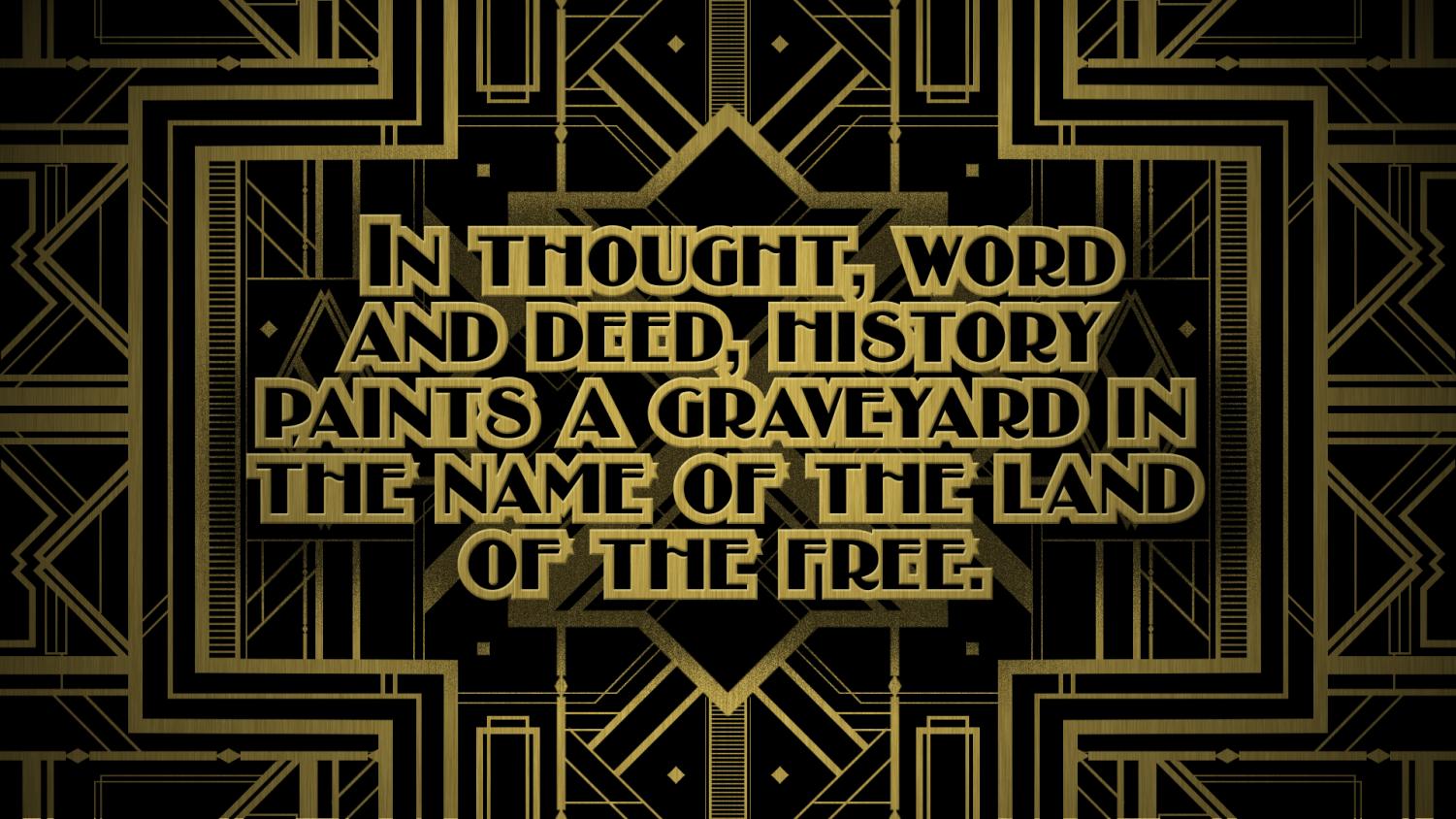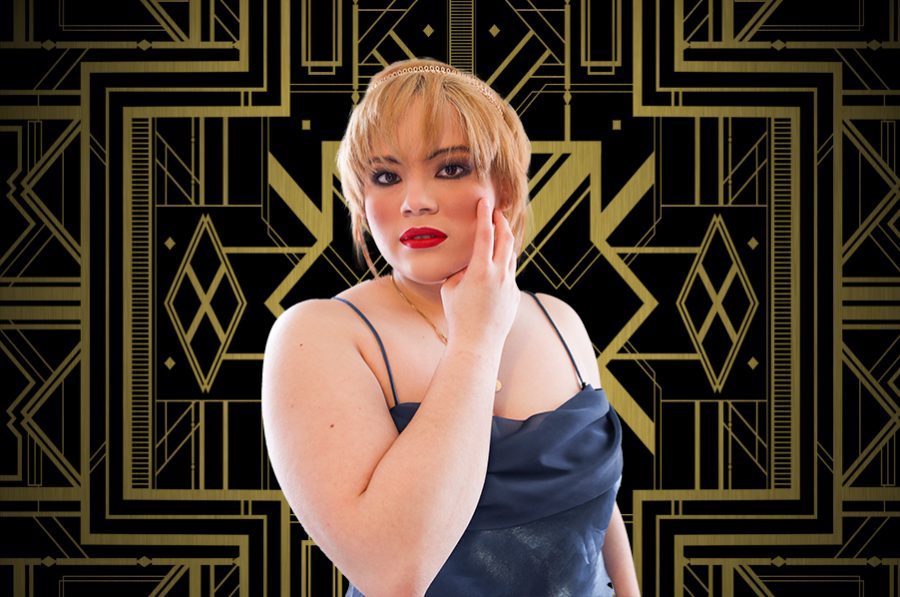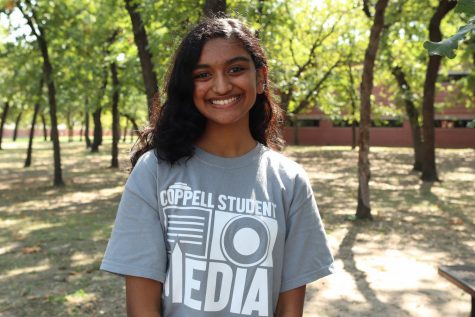Opinion: “Tomorrow we will run faster, stretch out our arms farther”
Reconceptualization of success offers new hope in nation’s future
New Tech High @ Coppell senior Rocio Arguello mimics “The Great Gatsby” movie cover. The Sidekick executive editor-in-chief Sally Parampottil argues the American Dream still exists in the form of equality, freedom and justice, instead of solely financial success. Photo illustration by Lilly Gorman and Samantha Freeman
January 22, 2021
In a sociology class the summer after my sophomore year, I learned the American Dream was dead.
Not explicitly, not definitively, but through a series of statistics and case studies of individuals who worked hard only to find themselves in the near same financial situation as when they started, it was clear the evidence pointed towards the idea that the American Dream wasn’t all it was made out to be.
In a discussion board, we were asked if we believed the American Dream is attainable and if it were true that anyone could find success if they worked hard enough.
The majority answer: yes.
The American Dream may not lie in socioeconomic mobility, but the definition of success does not always solely encompass money.
That day, more than two dozen versions of success drifted from my classmates’ heads and poured into their discussion board posts, redefining the American Dream. It took the shape of the older Filipina woman who had apologized for her lack of English in her first introduction post and was able to receive her higher education through the community college, and the shape of the Hispanic man establishing a better future for his kids, even if his own life had mainly been an uphill struggle.
It took the shape of the Indian girl who sees this country as her home, even if she was told by a classmate to go back to where she came from in the first grade.
Yeah, I’ve had my share of racism. Sexism. Discrimination.
The American Dream we came up with in that class saw opportunity beyond finance. It saw a blaze of American spirit that transcended the harsh realities of being a minority and broke through the common superficiality that has seeped into this consumer nation. More than money or fame, there were values and morals. Family, love, friendship and purpose swirled into the wisps of our collective dream cloud.
The United States was built on values and morals too: freedom, equality, justice. With all those supposedly established within a supposedly fair democratic republic, this country is supposedly a beacon of hope, a ray of light to shine for the world to see.
You would suppose incorrectly.

I love America. I think of where I am now and compare it to where I could have been had I been born and living in Kerala, the state in India where my parents are from, and I am eternally grateful for the opportunities I’ve been given.
At the same time, I know this country is nowhere near perfect.
While I may be able to step into public with a silver cross strung around my neck, I know a Muslim girl in a hijab may not feel the same security one should feel in a religiously tolerant nation. Someone’s love can be scrutinized and attacked. One gender feels accelerated fear of walking alone at night due to another.
Violence mars the vivid meaning behind the stars and stripes. The red of valor turns to blood, staining the purity and innocence of white while a corrupt blue of justice turns a blind eye. In thought, word and deed, history paints a graveyard in the name of the land of the free.
America is where it is because of a continued oppression of various groups throughout the span of its 244-year existence.
The nation has just woken from a four-year nightmare. Some of the worst of us were shown and the ugliest colors revealed, and while those blemishes on our nation remain a part of who we are, they are not who we only are and not only who we will ever be. As President Joe Biden said in his inaugural address:
“Don’t tell me things can’t change.”
In this era of unprecedented events, something familiar is the fight for positive change. Just as white male colonists decided to no longer stand for tyranny, the mentality of standing up for what one believes in trickles to the rest of the population. A young Black girl can fight for her right to live without discrimination, a Sikh man can fight against ignorance and bigotry, a pansexual woman can fight to defend her love from anyone trying to rip it away, and an immigrant boy can fight to say this is his country as well.
I’ve only just become an adult. I’m still being told my dreams are too big, my heart too naive. Perhaps my youth blinds me, but my vision for the future feels anything but clouded.
A better America exists. It’s attainable, and given the waves of activism spearheaded by people my age, it’s well on its way. Nothing will erase the past, but our future is in our hands, and it can be as beautiful as we wish.
I dream of the day when patriotism – which has taken a negative connotation of ignorance – is once again celebrated. The opportunities presented to me in the United States may not make me money, but they will shape a better nation for my children and their children and their children after.
My American Dream can very well come true, but it won’t be easy. We have to wake up each day and work. Then we sleep, wake up again and work some more. And we sleep and wake and work, this time with just a bit more love. We sleep, wake and work, this time with just a bit more energy. We sleep, wake and work, this time with just a bit more determination. We sleep, wake and work – resilient. Sleep, wake and work – unrelenting. Sleep, wake, work – persistent.
And one fine morning–we wake up and the American Dream is a dream no longer.
We wake up and know it is our reality.
Follow Sally (@SParampottil) and @CHSCampusNews on Twitter.














Emma Meehan • Jan 22, 2021 at 2:43 pm
Well-put as always, Sally!